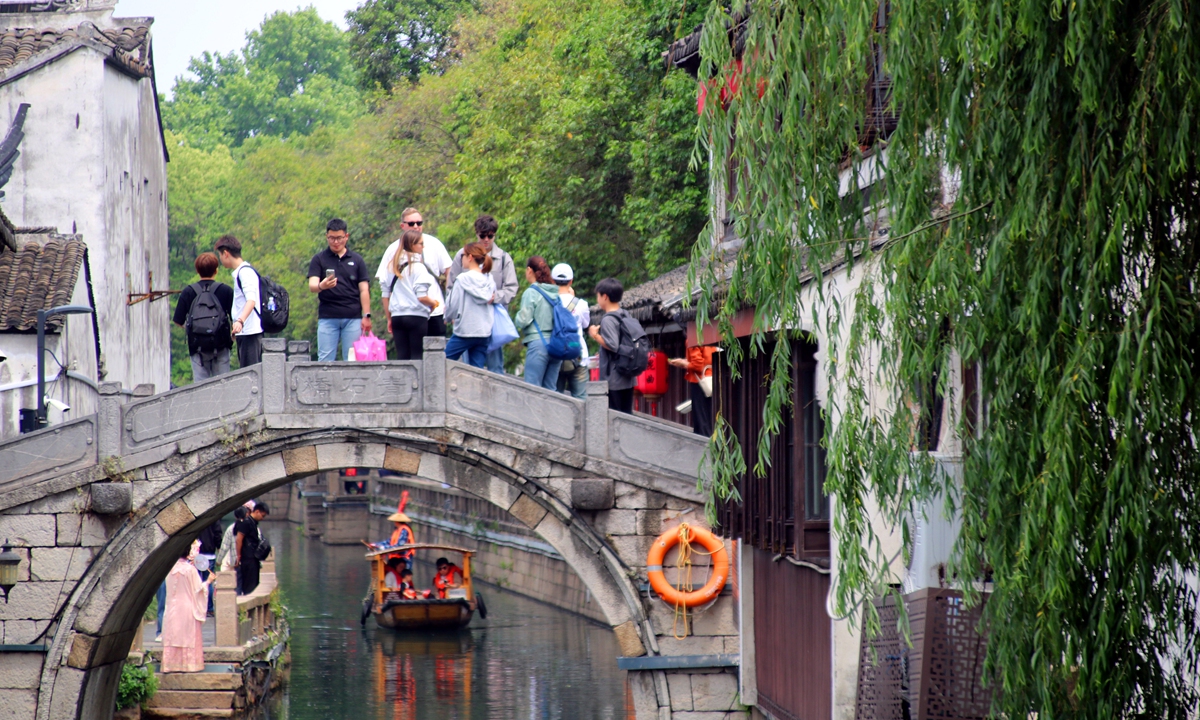
Tourists sightsee along the historic Pingjiang Road in Suzhou, East China's Jiangsu Province, on May 6, 2024. Various tourist attractions in Suzhou are ushering in a large number of tourists who are traveling off-peak after the five-day May Day holidays, which lasted from May 1 to 5. Photo: VCG
China's social media platform Sina Weibo punished 36 accounts and removed 759 posts related to a bus station attack in Suzhou during which two Japanese people and one Chinese national were injured. The platform said the content in question overly interpreted the accident and spread extreme speech that incites nationalistic sentiment, promoted group hatred, and even applauded criminal acts in the name of patriotism.
On Monday afternoon, a knife-wielding individual attack at a bus station in Suzhou resulted in one Chinese and two Japanese people injured. The suspect, a 52-year-old male surnamed Zhou, who recently arrived in the city and was unemployed, was apprehended at the scene, Suzhou police said on Tuesday.
Zhou is currently under criminal detention, and the case is under investigation, according to Suzhou police.
However, China's X-like platform Sina Weibo said on Wednesday night that it found some users deviated from rational discussion and over-interpreted the incident. They posted extreme opinions that incite nationalistic sentiment, promote group hatred, and even applaud criminal behavior in the name of patriotism.
In response, the platform took punitive measures to address the issue. It has removed 759 posts that incite hatred and beautify crimes, and punished 36 accounts that spread related content, from suspension to permanent shutting down the accounts.
The platform firmly supports and defends the rule of law, believing that suspects of crimes will receive the punishment accordingly. At the same time, it calls on all users not to overly interpret isolated incidents, or to promote violence and glorify crime in the name of patriotism. It asks users to report such violations and vows to deal with users in breach of the site's terms of use in a timely manner.
Mao Ning, spokesperson of China's Ministry of Foreign Affairs, said on a Tuesday briefing that China regrets the occurrence of such an incident and China will continue to take effective measures to ensure the safety of all foreigners in China.
"I want to emphasize that similar isolated incidents can happen in any country in the world, and China will continue to take effective measures to protect the safety of foreigners in China as we do for Chinese citizens," Mao said when reporters tried to link the Suzhou attack with the previous stabbing of four US teachers in Jilin.
China is widely recognized as one of the safest countries in the world, and we continue to welcome foreigners to come to China for tourism, study, business, and residency. We will continue to take effective measures to ensure the safety of foreigners in China, said Mao.
Following the incident, a number of foreign media outlets began to hype the incident, saying that it is a result of rising hatred against Japanese across Chinese society.
The Japan Times posed a question to an official at the Japanese Consulate-General in Shanghai as to whether strained ties between Japan and China could have been behind the attack. The official declined to comment.
There might be some "anti-Japan" sentiment online, but they are just small group of people who vent out their emotions on the internet. Those small fraction of netizens do not represent mainstream Chinese, who are peace-loving and law-biding, Lü Chao, a research fellow at the Liaoning Academy of Social Sciences, told the Global Times.
Even before further official investigation, Japanese media had already attempted to sensationalize of the incident, linking it with China's "nationalist sentiment" is trying to escalate tensions between China and Japan, incite anti-China sentiment among the Japanese public, and smear the image of Chinese people, Lü said.




